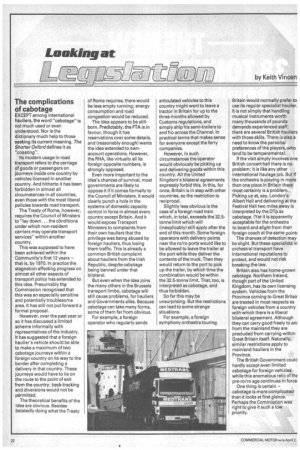The complications of cabotage
Page 24

If you've noticed an error in this article please click here to report it so we can fix it.
EXCEPT among international hauliers, the word "cabotage" is not much used or even understood. Nor is the dictionary much help to those seeking its current meaning. The Shorter Oxford defines it as "coasting".
Its modern usage in road transport refers to the carriage of goods or passengers on journeys inside one country by vehicles licensed in another country. And hitherto it has been forbidden in almost all circumstances in all countries, even those with the most liberal policies towards road transport.
The Treaty of Rome, however, requires the Council of Minsters to "lay down ... the cOnditions under which non-resident carriers may operate transport services" within another country.
This was supposed to have been achieved within the Community's first 12 years — that is, by 1970. In practice the stagnation affecting progress on almost all other aspects of transport policy has extended to this idea. Presumably thp Commission recognised that this was an especially sensitive and potentially troublesome area. It has still not put forward a formal proposal.
However, over the past year or so it has discussed a limited scheme informally with representatives of the industry. It has suggested that a foreign haulier's vehicle should be able to make a maximum of two cabotage journeys within a foreign country on its way to the border after completing a delivery in that country. These journeys would have to lie on the route to the point of exit from the country; back-tracking and diversions would not be permitted.
The theoretical benefits of the idea are obvious. Besides belatedly doing what the Treaty of Rome requires, there would be less empty running; energy consumption and road congestion would be reduced.
The idea appears to be stillborn. Predictably, the ETA is in favour, though it has reservations over some details, and (reasonably enough) wants the idea extended to ownaccount operations. However, the RHA, like virtually all its foreign opposite numbers, is strongly opposed.
Even more important to the idea's chances of survival, most governments are likely to oppose it if it comes formally to the Council of Ministers. It would clearly punch a hole in the systems of domestic capacity control in force in almost every country except Britain. And it would expose Transport Ministers to complaints from their own hauliers that the privilege was being abused by foreign hauliers, thus losing them traffic. This is already a common British complaint about hauliers from the Irish Republic, despite cabotage being banned under that bilateral.
But even when the idea joins the many others in the Brussels transport limbo, cabotage will still cause problems, for hauliers and Governments alike. Because cabotage can take many forms, some of them far from obvious.
For example, a foreign operator who regularly sends articulated vehicles to this country might want to leave a tractor in Britain for up to the three months allowed by Customs regulations, and simply ship his semi-trailers to and fro across the Channel. In practical terms that makes sense for everyone except the ferry companies.
However, in such circumstances the operator would obviously be picking up and delivering goods within this country. All the United Kingdom's bilateral agreements expressly forbid this. In this, for once, Britain is in step with other countries, so the restriction is reciprocal.
Slightly less obvious is the case of a foreign road train which, in total, exceeds the 32.5tonne limit which will (inexplicably) still apply after the end of this month. Some foreign operators with delivery points near the ro/ro ports would like to be allowed to leave the trailer at the port while they deliver the contents of the truck. Then they would return to the port to pick up the trailer, by which time the combination would be within the 32.5-tonne limit. That, too, is interpreted as cabotage, and thus forbidden.
So far this may be unsurprising. But the restrictions can lead to some strange situations.
For example, a foreign symphony orchestra touring Britain Would normally prefer to use its regular specialist haulier. It is not simply that handling musical instruments worth many thousands of pounds demands experienced staff; there are several British hauliers with those skills. There is also a need to know the personal preferences of the players, who tend to be temperamental.
If the visit simply involves one British concert hall there is no problem; it is like any other international haulage job. But if the orchestra is playing in more than one place in Britain there most certainly is a problem. Picking up at, say, London's Albert Hall and delivering at the Festival Hall two miles away is interpreted by the DTp as cabotage. (Yet it is apparently acceptable for the orchestra to board and alight from their foreign coach at the same point: The chances of detection may be slight. But these specialists in orchestral transport have international reputations to protect, and would not risk breaking the law.
Britain also has home-grown cabotage. Northern Ireland, though part of the United Kingdom, has its own licensing system. Vehicles from the Province coming to Great Britair are treated in most respects as foreign vehicles from a country with which there is a liberal bilateral agreement. Although they can carry good freely to anc from the mainland they are precluded from carrying within Great Britain itself. Naturally, similar restrictions apply to mainland hauliers in the Province.
The British Government could hardly accept even limited cabotage for foreign vehicles while this anomalous relic of thE pre-ro/ro age continues in force
One thing is certain — cabotage is more complicated than it looks at first glance. Perhaps the Commission was right to give it such a low priority.












































































